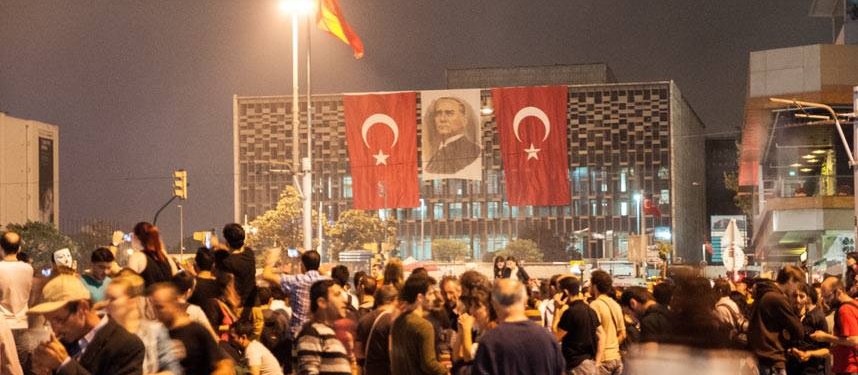Office closures, chaotic street scenes and the residual effects of teargas have all been faced by educators and agents over the last three weeks in Istanbul, Turkey. However, despite the publicity surrounding the clashes between protesters and police, professionals have told The PIE News that inbound and outbound mobility could get a boost from the unrest.
News and business analysis for Professionals in International Education
Have some pie!
Turkey unrest could boost mobility, say stakeholders
 Protesters gather in Taksim Square in Istanbul. Photo: David Mitchell
Protesters gather in Taksim Square in Istanbul. Photo: David Mitchell The protests, which began on May 28 after the government announced it would redevelop Gezi park in the city centre to make way for a shopping centre, have upended operations at many education agencies in Istanbul. According to Sedat Eren, Executive Director of Academic Study Abroad Services, the majority of agencies are based near the epicentre of the tension creating a “nightmare” situation.
“We may see an increase in the long-term enrolments especially for the college and universities for the fall”
“Logistically the demonstrations effected our business and offices heavily,” he said. “On some days offices were totally inoperable, some of our staff fainted from the teargas while walking to the office without even joining any of the protests. Even with all the windows closed tightly, everyone in the office still had tears in their eyes.”
More worryingly, students who needed to come to the office for visa appointments or advice “had a really hard time”. Still, Eren is optimistic the events could boost business, especially while the economy remains strong. “I believe families will be more eager to send their kids abroad. Younger generations usually get more frustrated about their future in these kinds of circumstances and will be more interested in studying abroad,” he said.
“As a matter of fact we may see an increase in the long-term enrolments especially for the college and universities for the fall and onwards.”
Similarly David Mitchell, Managing Director of Levant Education Group, which helps British institutions recruit in Turkey expects to see an increase in interest through the unrest. Frustration with state control over the media (the demonstrations were initially not covered by the mainstream media, leaving demonstrators to broadcast the story themselves) may drive up interest in English medium learning, for example.
“There will have been a massive realisation that not having the ability to communicate in English leaves one at a disadvantage,” said Mitchell. “Those with an awareness of international media, legal and political systems are better off than those without.”
When it comes to inbound mobility, educators in Turkey are equally optimistic. Turkey is already working to attract more international students and saw university enrolments double from 15,480 to 31,170 between 2005 and 2011, thanks to its affordable courses and relaxed student visa system. Publicity about clashes and student safety is unlikely to stop this, believes Ashnur Yalçin, International Office Specialist at Okan University, Istanbul.
“We are very immune now for these kinds of events. We are just positioning ourselves accordingly”
“Turkish young people have shown the world how they are creative, brilliant and open-minded [during the protests],” she said. “Concerning international student recruitment, Okan University’s applications show a large increase in the first two weeks of June, compared to the same period in 2012.”
Students from Pakistan are showing most interest for both undergraduate and graduate courses, she said, with interest in undergraduate degrees also coming from Germany, Syria and Azerbaijan and graduate courses from Libya.
Selime Tokoglu, organisers of the International Education Fairs of Turkey, also reassured foreign educators that the July and October events would carry on as usual, stressing that the risk of injury from any sort of political event or violence was “very low.”
As for the current disruption, Eren says most are taking it in their stride: “We have seen 9/11, the world financial crisis, the Iraq war, SARS, Avian Flu and Swine Flu. We are very immune now for these kinds of events. We are just positioning ourselves accordingly at the moment.”
Still looking? Find by category:


